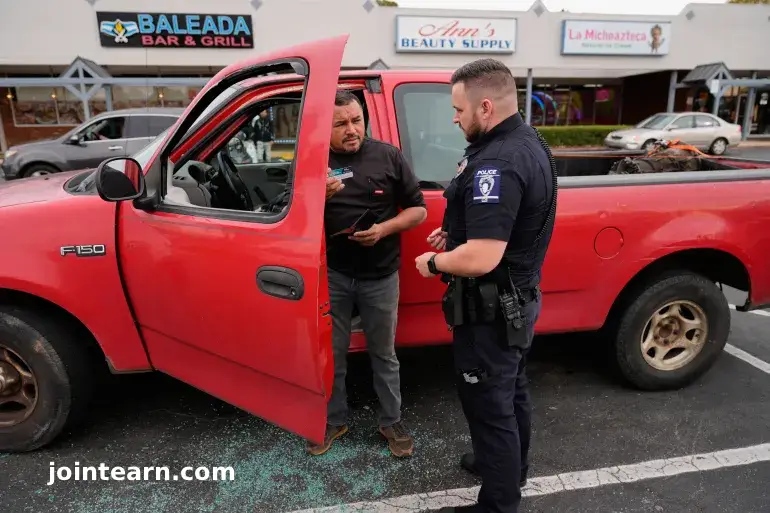
Federal authorities have launched a sweeping immigration crackdown in Charlotte, North Carolina, targeting undocumented migrants across multiple neighborhoods. The operation, part of the Trump administration’s latest enforcement measures, saw agents from ICE, Customs and Border Protection (CBP), and the Department of Homeland Security (DHS) deployed across the city on Saturday, November 15, 2025.
Charlotte, North Carolina’s largest city, has a diverse population of over 900,000 residents, including more than 150,000 foreign-born individuals. The deployment of federal agents has sparked widespread concern, protests, and allegations of civil rights violations.
Federal Authorities Justify Charlotte Immigration Sweep
Assistant Homeland Security Secretary Tricia McLaughlin issued a statement affirming the Trump administration’s rationale for the crackdown, citing concerns about crime allegedly committed by undocumented immigrants.
“Americans should be able to live without fear of violent criminal illegal aliens hurting them, their families, or their neighbors,” McLaughlin said. “We are surging DHS law enforcement to Charlotte to ensure Americans are safe and public safety threats are removed.”
This Charlotte operation mirrors similar enforcement initiatives in Democratic-led cities, including Chicago, Los Angeles, and Washington, D.C., as part of the administration’s broader immigration crackdown strategy.
Local Leaders Condemn Enforcement Actions
Charlotte Mayor Vi Lyles and other city officials quickly condemned the federal operation, arguing that the crackdown fosters fear and disrupts the lives of residents.
“We want people in Charlotte and Mecklenburg County to know we stand with all residents who simply want to go about their lives,” the officials stated, a declaration also signed by County Commissioner Mark Jerrell and Stephanie Sneed of the Charlotte-Mecklenburg Education Board.
Despite falling crime rates in Charlotte — with homicides, rapes, robberies, and vehicle thefts down more than 20% compared to last year — the federal government cited a high-profile case to justify the operation: the fatal stabbing of Ukrainian refugee Iryna Zarutska on a Charlotte light-rail train in August. A man with a lengthy criminal record has been charged with her murder.
Chaos on the Streets: Citizens Report Arrests and Confusion
Residents reported increased federal law enforcement activity since Friday, with numerous ICE and CBP agents making arrests and conducting vehicle stops.
Willy Aceituno, a 46-year-old Honduran-born US citizen, recounted being forcibly detained by Border Patrol agents who broke his vehicle window. “I told them, ‘I’m an American citizen,’” Aceituno said, describing repeated verification checks before he was released after presenting proof of citizenship. Aceituno filed a police report for the damaged property.
Other residents described scenes of panic, with witnesses noting “a lot of Latinos running” as agents conducted street-level enforcement operations.
Impact on Local Businesses and Communities
The sudden federal enforcement surge has also disrupted Charlotte’s economy and local businesses.
Greg Asciutto, executive director of CharlotteEast, described “significant Border Patrol activity” in parts of the city, including quick, targeted arrests alongside less focused “fishing” operations. Many businesses in affected neighborhoods temporarily closed out of fear for employees and customers.
City Council member JD Mazuera Arias, stationed outside a local Latin American bakery, emphasized the harm to livelihoods. “This is Customs and Border Patrol. We are not a border city, nor are we a border state. So why are they here?” he said. “This is a gross violation of constitutional rights for not only immigrants but for US citizens.”
State Officials Call for Accountability
North Carolina Governor Josh Stein, a Democrat, criticized the operation, noting that the majority of those detained have no criminal convictions, and some are American citizens. Stein urged residents to document any inappropriate actions by federal officers and report them to local law enforcement.
The Charlotte-Mecklenburg Police Department reiterated that it is not participating in federal immigration enforcement, emphasizing that residents should remain vigilant about distinguishing between local and federal authority.
National Context: Trump Administration’s Immigration Enforcement
The Charlotte crackdown reflects the Trump administration’s continued commitment to aggressive immigration enforcement, even in non-border states and cities. Federal officials have defended the operations as necessary for public safety, though the actions have prompted allegations of civil rights violations, lawsuits, and widespread fear among immigrant communities.
Critics argue that such crackdowns exacerbate distrust between law enforcement and immigrant communities while potentially targeting lawful residents. Supporters maintain that federal enforcement is essential for deterring crime and ensuring compliance with immigration laws.
Conclusion
The ongoing Trump administration immigration sweep in Charlotte highlights the tension between federal enforcement priorities and local governance in Democratic-led cities. As arrests continue and federal agents maintain a visible presence, residents, business owners, and civic leaders are grappling with fear, disruption, and questions about civil liberties.
The operation in Charlotte serves as a stark example of the national debate surrounding immigration policy, enforcement, and the balance of public safety with constitutional rights in the United States.


Leave a Reply